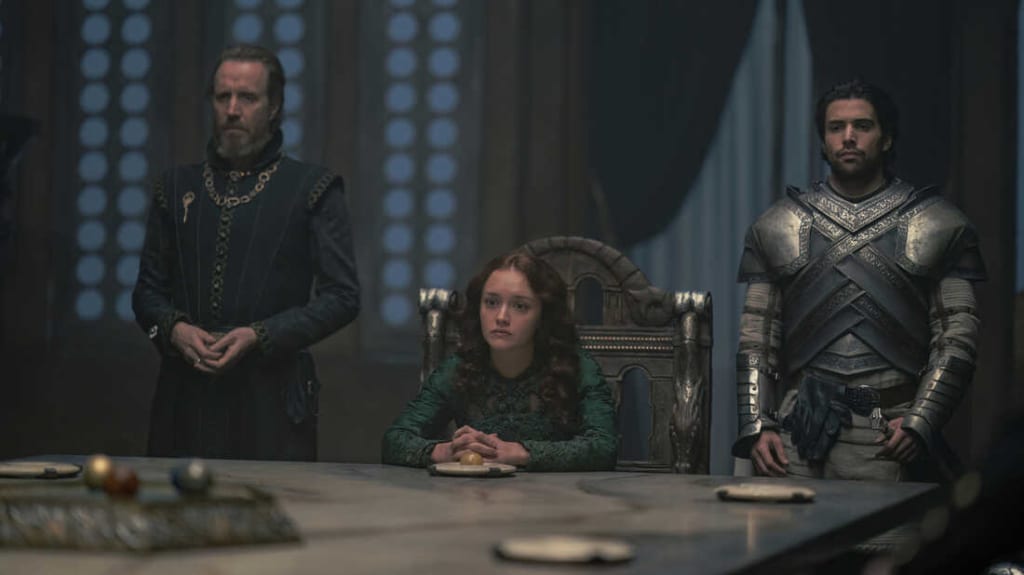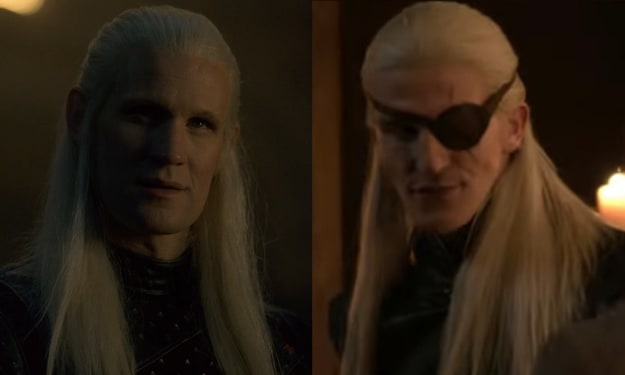
Every ninth episode of a Game of Thrones season was a blockbuster. Episode 9s shocked viewers with Ned Stark’s death and the Red Wedding, and delighted them with the battles of the Bastards and the Blackwater.
After the emotional peaks of “The Lord of the Tides,” possibly the best House of the Dragon episode thus far, hopes were high for Dragon’s first Episode 9. But “The Green Council” is an underwhelming mess, and the low point of an otherwise enjoyable first season of franchise television.
In contrast to every Thrones season’s penultimate effort, this Episode 9’s characters weren’t compelling. Its tension didn’t rise. And its action fell flat as the episode stumbled to a close. There’s still room for Dragon to rebound as the Targaryen civil war begins in earnest. But here are five overarching reasons the Dance of the Dragons is off to a lackluster start.
1. Uneven Pacing
In general, "The Green Council" follows a similar plot: the greens' struggle to crown Aegon after King Viserys's passing in Episode 8's final moment. However, the transition from the king's death to the installation of a new king was incredibly hurried and subsequently incredibly uneven.
In the Fire & Blood book, Viserys's passing sparks a protracted discussion regarding the Small Council's course of action and who they should crown. Not least due to the title of this episode, such was the expectation shown on the screen as well.
Yet this scene moves much more hastily, and ends much more abruptly, in “The Green Council.” Right away, the council moves to implement its “long-laid plans,” as Tyland Lannister says. “Yes,” Otto Hightower adds, “there is much to be done, as we’ve previously discussed”—which is how both Alicent and the audience learn that the Small Council has secretly schemed to crown Aegon for a while.
Dragon informs viewers that these key conversations have already taken place and that it is time to move on rather than actually showing them. Ser Criston then murders Lyman Beesbury by slamming his face against a tiny attendance stone in response to his protests. None of Beesbury's devoted coworkers, with the exception of Harrold Westerling, lord commander of the Kingsguard, seemed to give a damn or even register shock at his untimely passing. It's time to continue moving forward.
And within minutes, with scarcely any debate, the meeting breaks. It’s time to move on again; the rest of the episode awaits. And while some of this disorganization may reflect the greens’ desire to proceed to Aegon’s coronation as quickly as possible, the result is that most of the episode dramatizes less interesting material than the missing debate over who should rule the Seven Kingdoms as Viserys’s heir.
2. A Lack of Dramatic Tension
Speaking of that less interesting material: The episode’s main problem is a lack of tension commensurate with its placement in the season. For large swaths of the episode, I was bored! In an Episode 9!
That’s because the central tension of the episode isn’t whether Aegon will be crowned instead of Rhaenyra. That much is a fait accompli, decided minutes in; as Alicent says when pleading her case to Rhaenys, “Aegon will be king.”
Rather, the central tension is whether Otto’s men or Alicent’s will find Aegon first, because Otto tasks the Cargyll twins, Arryk and Erryk, with bringing Aegon to him—at the same time that Alicent asks Criston and Aemond to deliver her son to her. But Otto and Alicent are on the same general side in this conflict. Rhaenyra and Daemon, leaders of the opposing succession faction, don’t appear in this episode at all—an intentional narrative choice, because their absence highlights their removal from any of the decisions taken in the immediate aftermath of Viserys’s death, but one that saps much of the dramatic tension from the episode.
Alicent does not want the murder of her former friend Rhaenyra, nor does she believe Viserys would have wanted his eldest daughter to perish. Otto wants Rhaenyra executed immediately to eliminate any threat to Aegon's newly established rule. While it's difficult to imagine or define what Alicent means when she says, "We will send terms to Rhaenyra on Dragonstone—true terms, such that she may accept without shame," she doesn't have a viable alternative plan for handling the deposed heir. Instead, she tells Otto, "We will send terms to Rhaenyra on Dragonstone."
Otto and Alicent are aligned on the most important decision, though, as they both want Aegon crowned, so the tension between them feels manufactured. Much of the episode tracks the royal hide-and-seek game through the streets of King’s Landing, but the outcome seems predetermined either way: If the Cargylls found Aegon first, Aegon would sit the Iron Throne and Rhaenyra wouldn’t. If Criston and Aemond found Aegon first … Aegon would still sit the Iron Throne and Rhaenyra still wouldn’t.
Perhaps Alicent feels strongly about the outcome because she wants a chance to beg the upcoming king not to murder his half sister. What does Alicent's victory in the episode-long Aegon scavenger hunt mean for the audience, though? Otto can talk to Aegon later, so it's not like he won't be able to.
3. The Fallout of Viserys’s Final Words
One key reason for the missing tension in “The Green Council” is that essentially everyone in this episode—or, at least, essentially everyone with power—wants Aegon to be king. That count includes Alicent, who just last episode told Rhaenyra she’d be a good queen, and who clearly is repulsed by her eldest son’s behavior.
But her mind changes because of how Episode 8 ends, with a miscommunication straight out of a soap opera. In his dying moments, Viserys mistakes Alicent for Rhaenyra and tells her he believes in Aegon’s dream. The result is predictable, as Alicent seizes on Viserys’s babbling as a true change of heart and spends Episode 9 repeatedly telling disbelievers that she witnessed a deathbed audible by the king.
Despite many other possible explanations for wanting her son crowned, the addled Viserys’s utterance is Alicent’s entire justification for Aegon’s claim in “The Green Council.” Does Alicent voice her fears that Rhaenyra and Daemon might kill Aegon, Helaena, and Aemond to remove potential challengers to the throne? Does she reference her opinion of Rhaenyra’s haughtiness and impurity? Does she worry about how best to unite a realm that she believes won’t accept a woman’s rule? No, no, and no—she only says, as he tells Rhaenys, “It was my husband’s dying wish.”
Maybe Aegon’s coronation would have pressed onward even without Alicent’s support, given the Small Council’s secret planning. But if Alicent had remained conflicted about her son’s impending rule, or even opposed to it, then the episode’s events might have unfolded differently, with more actual tension between its main characters.
That this change came about because of a foolish miscommunication is entirely out of step with how consequences typically transpire in this grounded story. An entire civil war brought about, apparently, because too many Targaryens are named Aegon. Dr. Seuss’s “Too Many Daves” didn’t change the fate of an entire continent.
About the Creator
k eleanor
Writer focused on film, media, fandom, music, comic, and all things geeky. Here you'll find Breakdowns, Analysis, Easter Eggs of Movies and series. Every universe comes together at this place. So just sit back, relax and enjoy the ride.






Comments
There are no comments for this story
Be the first to respond and start the conversation.